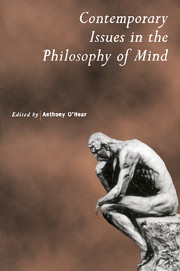Book contents
- Frontmatter
- Contents
- Notes on Contributors
- Introduction
- The Mind–Body Problem After Fifty Years
- How to Find the Neural Correlate of Consciousness
- Embodiment and the Philosophy of Mind
- Folk Psychology and Mental Simulation
- Understanding Other Minds from the Inside
- Self-knowledge: the Wittgensteinian Legacy
- Joint Attention and the First Person
- Consciousness as Existence
- Setting Things before the Mind
- Perceptual Intentionality. Attention and Consciousness
- Experience and Reason in Perception
- Intentionality as the Mark of the Mental
- Intentionality and Interpretation
- Externalism and Norms
- Mind, World and Value
- Mind, Knowledge and Reality: Themes from Kant
- The Modality of Freedom
- Dualism in Action
- Index
Dualism in Action
Published online by Cambridge University Press: 12 May 2010
- Frontmatter
- Contents
- Notes on Contributors
- Introduction
- The Mind–Body Problem After Fifty Years
- How to Find the Neural Correlate of Consciousness
- Embodiment and the Philosophy of Mind
- Folk Psychology and Mental Simulation
- Understanding Other Minds from the Inside
- Self-knowledge: the Wittgensteinian Legacy
- Joint Attention and the First Person
- Consciousness as Existence
- Setting Things before the Mind
- Perceptual Intentionality. Attention and Consciousness
- Experience and Reason in Perception
- Intentionality as the Mark of the Mental
- Intentionality and Interpretation
- Externalism and Norms
- Mind, World and Value
- Mind, Knowledge and Reality: Themes from Kant
- The Modality of Freedom
- Dualism in Action
- Index
Summary
We know what one dualist account of human action looks like, because Descartes gave us one. I want to explore the extent to which present-day accounts of physical action are vulnerable to the charges that may be made against Descartes's dualist account. I once put forward an account of human action, and I have always maintained that my view about the basic shape of a correct ‘theory of action’ can be combined with a thoroughgoing opposition to dualism. But the possibility of the combination has been doubted, and it will remain doubtful until we have a better understanding of what makes an account objectionably dualistic. In this paper, I hope to deflect some of the criticisms aimed against what I shall call my account, and to show that when they are turned onto their proper path their actual target is some physicalist accounts.
I shall have to rely on one intuitive understanding of physical action here. According to this, where there is a physical action, a person moves, and there is a psychological explanation of a certain sort of something that she thereby does. This takes it for granted that human agency is evinced when someone does something intentionally, and that when people do things by moving their bodies, they are involved in events. Using this conception, and assuming a certain account of events' individuation, one can say that any action is some person's moving her body (usually her moving of a bit of it).
- Type
- Chapter
- Information
- Contemporary Issues in the Philosophy of Mind , pp. 377 - 402Publisher: Cambridge University PressPrint publication year: 1998
- 1
- Cited by

